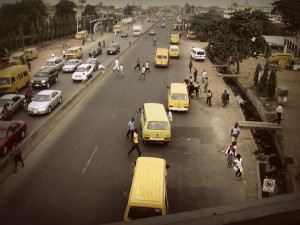The rule is unwritten, but most likely more prevalent than reported: the traveller recently returning from a long stay abroad gets a major pass on the first few comments on discomfort with the new environment. The privilege of the pass lasts about a few weeks long, and then it ends. There is a second rule, that there is always a larger than needed (but mostly uncontrollable) tendency to compare the state of a present place to the state of the place where he/she had previously spent some time.
In Edwardsville: Why do American students dress so casually to class? What is the point of stop signs in deserted neighbourhoods? Why the need for so many guns in the hands of citizens? Why do people mind their business so much? Why does the advertising environment allow for so much name-calling of one’s opponent? Why is there so much money (and corruption) in the country’s politics? Why do people hate Obama so much? Why’re some republicans so dumb?
 In Lagos: Why the absence of enough trash baskets by the roadside? Why do citizens choose to cross the road on foot rather than use the pedestrian bridges? Why do we pay so much for internet and get so little service? Why the prevalence of pay-as-you-go phone service instead of standard monthly packages? Why do policemen carry heavy arms openly on the roads? Why so many cars in this state? And why does a trip from one part of the state to the other take about the same time to travel from Ibadan back to Lagos, twice.
In Lagos: Why the absence of enough trash baskets by the roadside? Why do citizens choose to cross the road on foot rather than use the pedestrian bridges? Why do we pay so much for internet and get so little service? Why the prevalence of pay-as-you-go phone service instead of standard monthly packages? Why do policemen carry heavy arms openly on the roads? Why so many cars in this state? And why does a trip from one part of the state to the other take about the same time to travel from Ibadan back to Lagos, twice.
Purpose and meaning sometimes intersect at weird mental junctions in the head, and the self questions its own hubris. What is the point of intervention when things will move as they must no matter what? In the end, the cost of intervention sometimes isn’t worth the trouble of imposing an earlier image onto a current, living, one. I spied Nigeria’s Nobel Laureate for Literature, Wole Soyinka, at the Lagos airport a few weeks ago, his grey hair distinct somewhere ahead in the sea of a small crowd within the arrival lounge. For a man whose life has sometimes taken the form of a road itself around many continents and in many capacities, a faint resignation must exist somewhere in him about the nature of things and their need to finally merely remain what they are out of the worries of man and the hubris of his ambitions. Each society will exist in its own frame, and must rise and fall according to it, sometimes with or without explicit external influence. The fact of life and the inevitability of movement and exchange, in themselves, are perhaps already a signal of progress.
That resignation makes everything else easy to bear. The messiah in us takes a hint, and gently returns to bed soon enough, until something random suddenly ignites its ever excitable self again.
No Comments to The Messiah Complex so far. (RSS Feeds for comments in this post)
No one has commented so far, be the first one to comment!